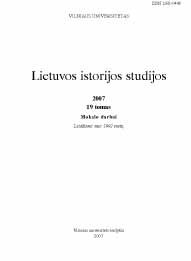RUSIJOS IR LIETUVOS SANTYKIAI XX AMŽIAUS ŠIUOLAIKINEJE LIETUVIU ISTORIOGRAFIJOJE
RELATIONS BETWEEN RUSSIA AND LITHUANIA IN THE CONTEMPORARY LITHUANIAN HISTORIOGRAPHY
Author(s): Nerijus ŠepetysSubject(s): History
Published by: Vilniaus Universiteto Leidykla
Summary/Abstract: It is impossible to imagine the 20th century in the history of Russian and Lithuanian relations without the “soviet power” brought on the bayonets of the Red Army. Lithuania successfully fended off the bayonets’ thrust in 1918–1919, however these bayonets subdued Lithuania with insidiousness and constraint in 1940 and by force and violence in 1945 but in 1991-1993 these bayonets left Lithuania taking away the memory of soviet power. Thus, the historical research on the Russian Lithuanian relations is in permanent difficulty and especially because of memory, forgetfulness or even purposive historical policy. The situation of Lithuanian historiography considering the aspect of political and scientific freedom is obviously better than the one in Russia although Lithuanian historians have not produces many substantial works on the 20th century interstate relations. The most important works are devoted to the state’s foundation and the interwar period. Scientific works by È. Laurinavièius, R. Lopata, A. Kasparavièius, Z. Butkus and by other historians written during the first decade of independence prove the existence of a strong school of diplomatic historiography. During the last five years the trend of diplomatic historiography has been gradually replaced with the fashion of geopolitical interpretations, which are partly spread by former historians of diplomacy (È. Laurinavièius, R. Lopata). Concentration on legal aspects of the 20th century Lithuanian Russian relations could be determined as a constant tendency in Lithuanian historiography. This tendency is strengthened by the fact that communist era has never been legally or morally evaluated on the international scale. It should be pointed out that historical research on occupation, repressions and anti-Soviet resistance seldom oversteps the factographic limits and it is difficult for the authors working in this field to perceive their “material” through a prism of relations between two political subjects (the USSR and Lithuania). According to present historians it was only the Lithuanian nation that suffered all misfortunes or changes related to the soviet occupation. The concept of Lithuanian state usually falls out of such historiography or appears in a remote place (Lithuania in 1940–1990: history of occupied Lithuania). The situation of historical research during the last twenty years on the Lithuanian Russian relations and especially on the collapse of the USSR and liberation of Lithuania is the most dynamic and the most complicated at the same time. The historiographical fashion for professional Lithuanian historians is imposed by the memoirs of the political figures of that time, overviews and analysis of journalists, lawyers and politologists, not to mention the works by foreign historians (A. E. Senn, F. Salzmann, B. Christophe).
Journal: Lietuvos istorijos studijos
- Issue Year: 2007
- Issue No: 19
- Page Range: 150-162
- Page Count: 13
- Language: Lithuanian

